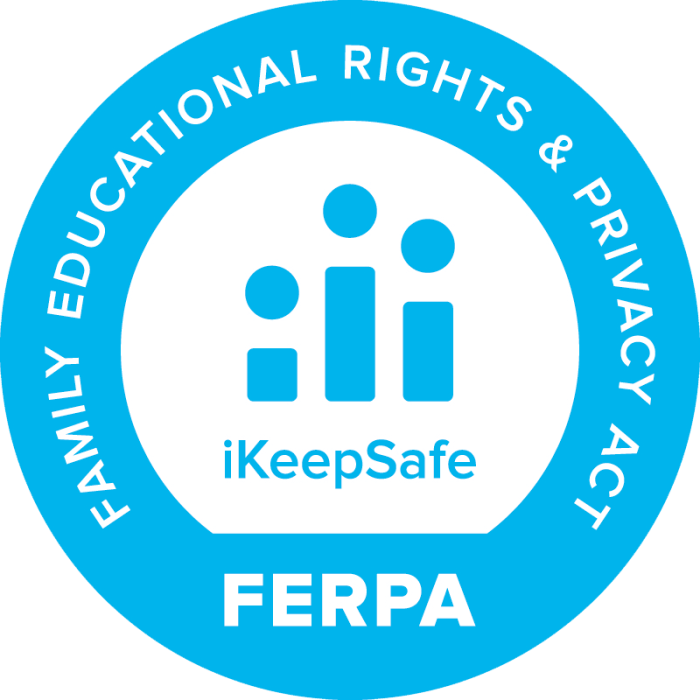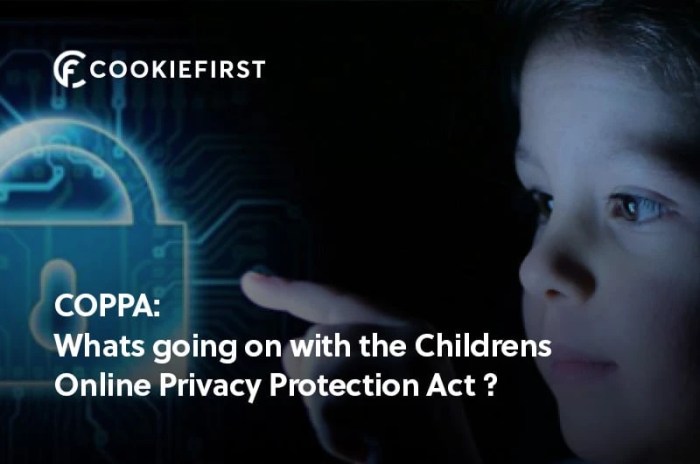COPPA Act and Children’s Online Privacy
The Children’s Online Privacy Protection Act (COPPA) is a US federal law that aims to protect the online privacy of children under 13 years old. It sets specific rules for websites and online services that collect, use, or disclose personal information from children.
COPPA’s primary goal is to ensure that children’s personal information is handled responsibly and with their parents’ consent. The law empowers parents to have control over what information is collected about their children and how it’s used.
Impact of COPPA Regulations
COPPA regulations have a significant impact on how websites and online services operate, particularly those targeting children or collecting data from them. Here are some key ways COPPA influences online services:
- Notice and Choice: Websites and services must provide clear and understandable privacy policies explaining what information they collect, how they use it, and how parents can access, delete, or refuse the collection of their children’s information.
- Parental Consent: Before collecting, using, or disclosing personal information from children, websites and services must obtain verifiable parental consent. This can be done through various methods, such as email verification, online forms, or telephone calls.
- Data Security: Websites and services must take reasonable measures to protect children’s personal information from unauthorized access, use, or disclosure. This includes implementing appropriate security safeguards and practices.
- Limited Use and Disclosure: COPPA restricts the use and disclosure of children’s personal information. Websites and services can only use it for the purposes stated in their privacy policies and with parental consent. They are generally prohibited from selling or sharing children’s information with third parties without parental consent.
- Enforcement and Penalties: The Federal Trade Commission (FTC) enforces COPPA. Websites and services that violate the law can face significant fines and other penalties.
Cortana and Data Collection
Cortana, Microsoft’s virtual assistant, collects a significant amount of user data to provide personalized services and enhance its capabilities. Understanding the types of data collected and the potential privacy implications is crucial, especially when considering the use of Cortana by children.
Data Collection Practices
Cortana collects a variety of data from its users, including:
- Search queries: This includes the words and phrases you use when searching for information on Cortana.
- Voice recordings: Cortana captures and stores your voice commands and conversations to understand your requests and improve its speech recognition capabilities.
- Location data: To provide location-based services, Cortana collects information about your physical location, including your GPS coordinates and Wi-Fi network access points.
- Calendar and contact information: If you choose to sync your calendar and contacts with Cortana, it will access and store this information to manage your schedule and connect with others.
- Usage data: Cortana tracks your interactions with the assistant, including the features you use, the time spent on tasks, and the frequency of use.
- App and browser activity: Cortana may collect information about the apps you use and the websites you visit to provide personalized recommendations and improve its understanding of your interests.
Privacy Concerns Related to Data Collection
Cortana’s data collection practices raise several privacy concerns, especially for children:
- Sensitive personal information: The collection of voice recordings and location data can expose sensitive personal information, which may be vulnerable to misuse or unauthorized access.
- Data retention and security: The long-term storage of user data raises concerns about its security and potential breaches, which could expose children’s personal information to unauthorized parties.
- Targeted advertising: Cortana’s data collection practices can be used to create detailed user profiles that can be exploited for targeted advertising, which may expose children to inappropriate content or influence their purchasing decisions.
- Lack of transparency and control: Children may not fully understand the extent of Cortana’s data collection practices or have the ability to control the information shared.
COPPA Compliance
Cortana’s data collection practices must comply with COPPA regulations, which aim to protect children’s online privacy.
- Parental consent: COPPA requires parental consent before collecting, using, or disclosing personal information from children under 13. Cortana’s data collection practices must ensure that parental consent is obtained before collecting data from children.
- Data minimization: COPPA emphasizes the importance of data minimization, meaning that only necessary data should be collected and retained. Cortana’s data collection practices should be limited to the information required to provide its services and avoid unnecessary collection of personal information.
- Data security: COPPA requires companies to implement reasonable security measures to protect children’s personal information. Cortana must ensure that its data storage and transmission practices are secure and comply with COPPA requirements.
- Transparency and access: COPPA requires companies to provide clear and understandable privacy policies and allow parents to access, delete, and correct their children’s personal information. Cortana’s privacy policy should be easily accessible and provide clear information about its data collection practices, parental consent requirements, and data security measures.
Age Verification and Restrictions
In the digital age, ensuring the safety of children online is paramount. The Children’s Online Privacy Protection Act (COPPA) sets strict guidelines for websites and online services that collect personal information from children under 13. Cortana, as a powerful AI assistant, must adhere to these regulations to protect young users.
Coppa act prevents cortana from being used by those under 13 – Verifying the age of users online presents significant challenges. Traditional methods, like asking users to enter their birthdate, are easily circumvented. Furthermore, the dynamic nature of the internet makes it difficult to track user behavior and identify potential underage users. COPPA requires websites and services to take reasonable steps to verify the age of users under 13. This includes obtaining verifiable parental consent before collecting, using, or disclosing personal information from children.
While the COPPA Act might be keeping Cortana out of the hands of kids under 13, it’s clear that some things are just meant for grown-ups. Take the success of Bloodborne, for example, which recently hit a milestone of a million copies sold. Check out the details of the latest 1.03 update here , and you’ll see why it’s a game that’s not for the faint of heart, much like the COPPA Act’s strict rules.
Methods for Enforcing Age Restrictions
To comply with COPPA, Cortana could implement several methods for age verification and restriction:
Cortana could utilize a combination of these methods to ensure the safety and privacy of children while providing a valuable service to older users. The effectiveness of these methods will depend on the specific context and user experience. Ongoing monitoring and refinement of these methods are crucial to maintain compliance with COPPA and protect children online.
Impact on User Experience
The COPPA Act’s age restrictions for Cortana have a significant impact on the user experience for children under 13. While the aim is to protect young users’ privacy, it inevitably limits their access to Cortana’s full range of features and functionalities.
Functionality Limitations
Age restrictions imposed by COPPA can limit the functionality available to users under 13. For example, children may not be able to use Cortana for:
- Personalized recommendations: Cortana’s ability to provide tailored recommendations based on user data, such as browsing history or purchase preferences, might be restricted. This could limit the usefulness of Cortana for tasks like finding information, suggesting products, or planning activities.
- Advanced search: Children might not have access to advanced search features that rely on user data, such as voice search, location-based search, or image search. This could make it more challenging for them to find specific information or resources.
- Third-party integrations: Cortana’s integration with third-party apps and services, such as social media platforms or music streaming services, might be restricted for users under 13. This could limit their ability to use Cortana for activities like scheduling appointments, sending messages, or listening to music.
Alternative Approaches
While adhering to COPPA regulations, Microsoft can explore alternative approaches to provide a safe and engaging experience for young users:
- Simplified interface: A dedicated interface designed specifically for children, with a simplified design and limited features, could provide a safe and engaging experience. This interface could focus on age-appropriate functionalities, such as basic tasks, educational resources, and entertainment.
- Parental controls: Microsoft could offer parental controls that allow parents to manage their children’s access to Cortana and its features. This could include options to set time limits, block specific content, or restrict access to certain functionalities.
- Educational content: Cortana could be used to provide educational content and resources for children. This could include interactive learning experiences, educational games, and access to online learning platforms.
Implications for Microsoft: Coppa Act Prevents Cortana From Being Used By Those Under 13
The potential legal and reputational risks for Microsoft if Cortana is found to violate COPPA are significant. The company could face substantial fines, lawsuits, and damage to its brand image. Additionally, the implications extend beyond legal consequences, impacting user trust and potentially hindering future product development.
Legal and Reputational Risks, Coppa act prevents cortana from being used by those under 13
If Microsoft is found to have violated COPPA, the company could face a range of legal consequences. The Federal Trade Commission (FTC) has the authority to enforce COPPA and can impose significant fines. For example, in 2020, the FTC fined TikTok $5.7 million for allegedly collecting personal information from children without parental consent. In addition to fines, Microsoft could also face lawsuits from parents or other individuals who believe their children’s privacy has been violated.
Beyond legal consequences, Microsoft could also suffer significant reputational damage. A finding of COPPA violation could erode public trust in the company and its products. This could lead to a decline in sales and market share, as consumers may be hesitant to use products from a company that has been accused of violating children’s privacy.
Adjusting Policies and Practices
Microsoft can take several steps to ensure Cortana complies with COPPA.
- Implement robust age verification mechanisms to prevent children under 13 from accessing Cortana. This could involve requiring users to provide a date of birth or using other methods to verify age.
- Clearly disclose data collection practices and obtain parental consent before collecting personal information from children. Microsoft should provide parents with clear and concise information about what data is collected, how it is used, and how parents can access, modify, or delete their child’s data.
- Implement strong security measures to protect children’s personal information from unauthorized access, use, or disclosure. This includes using encryption, access controls, and other security measures to safeguard data.
Examples of COPPA Compliance
Other tech companies have implemented various measures to ensure compliance with COPPA.
- Google: Google has implemented a robust COPPA compliance program for its services, including YouTube Kids. The company uses age verification mechanisms, parental consent forms, and data deletion options to protect children’s privacy.
- Disney: Disney has a dedicated COPPA compliance team that reviews its websites and apps to ensure they comply with the law. The company also provides parents with clear information about data collection practices and allows parents to access, modify, or delete their child’s data.
- Amazon: Amazon has implemented a COPPA compliance program for its Amazon Kids+ service. The company uses age verification mechanisms, parental controls, and data deletion options to protect children’s privacy.
The COPPA Act’s impact on Cortana’s availability for children under 13 raises crucial questions about the balance between technological advancement and safeguarding young users’ online privacy. Microsoft faces the challenge of finding ways to comply with COPPA regulations without compromising the user experience. The future of Cortana for younger audiences hinges on finding innovative solutions that address both legal requirements and the need for engaging digital experiences. This ongoing debate highlights the complexities of navigating the digital landscape while prioritizing the safety and well-being of children.
 Standi Techno News
Standi Techno News

